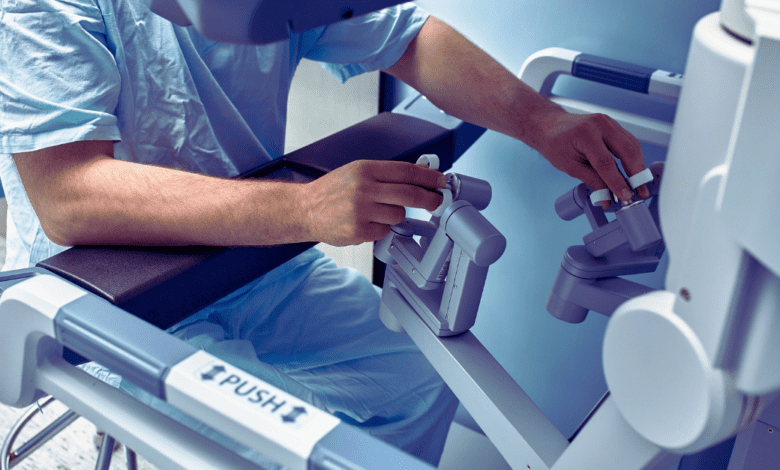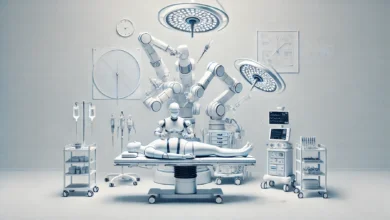Robotic Bariatric Surgery: The Future of Weight Loss

Enter robotic bariatric surgery—a cutting-edge advancement that is transforming the way weight loss surgeries are performed.
Obesity is one of the leading global health concerns, and bariatric surgery has become a highly effective solution for long-term weight loss and improvement of obesity-related conditions. But as technology evolves, so do surgical techniques.
This guide explores what robotic bariatric surgery is, how it compares to traditional methods, its benefits, and what patients can expect from this high-tech approach to a healthier life.
What Is Robotic Bariatric Surgery?
Robotic bariatric surgery refers to weight loss procedures performed with the assistance of robotic surgical systems, most commonly the da Vinci® Surgical System. These systems don’t operate independently—they are guided by skilled surgeons who control robotic arms with high precision using a console.
The robot provides enhanced visualization, better instrument dexterity, and more precise movements than the human hand, especially in complex or minimally invasive procedures.
Robotic technology is used in several types of bariatric surgeries, including:
- Sleeve gastrectomy
- Gastric bypass (Roux-en-Y)
- Duodenal switch
- Revisional bariatric surgeries
How Does It Work?
During robotic bariatric surgery, the surgeon makes a few small incisions in the abdomen. Through these incisions, the robotic arms are inserted, each equipped with a surgical instrument. A high-definition 3D camera provides the surgeon with a magnified view of the operating area.
Sitting at a console, the surgeon uses controls that translate their hand, wrist, and finger movements into precise actions by the robotic instruments. The system eliminates hand tremors and enables more refined movements than traditional laparoscopy.
Benefits of Robotic Bariatric Surgery
The integration of robotics into bariatric surgery brings a number of significant advantages:
🔍 Enhanced Precision
The robot allows for incredibly accurate dissection and suturing, reducing the risk of human error during delicate steps of the procedure.
📉 Less Blood Loss
With improved control, there is often less tissue trauma and bleeding, leading to a safer overall procedure.
🕒 Faster Recovery
Patients often experience less postoperative pain and faster return to daily activities thanks to smaller incisions and reduced internal trauma.
👁 Better Visualization
The 3D camera offers a magnified view of the surgical field, allowing the surgeon to see structures and tissues in great detail.
🔁 Ideal for Complex or Revisional Surgeries
Robotic technology shines in situations where anatomy is altered or previous surgeries have created scar tissue.
Is It Better Than Traditional Bariatric Surgery?
Robotic bariatric surgery offers many of the same benefits as laparoscopic (keyhole) bariatric surgery—minimal scarring, reduced pain, shorter hospital stays—but with added precision and control.
However, it’s important to note that:
- Outcomes for robotic and laparoscopic bariatric surgeries are generally similar in terms of weight loss.
- The robotic option may take slightly longer due to the setup and calibration of the system.
- Not all hospitals or surgeons offer robotic bariatric surgery, and it may involve higher costs depending on your location or insurance plan.
Who Is a Good Candidate?
Most patients eligible for traditional bariatric procedures can also undergo robotic bariatric surgery. You may be a candidate if:
- Your BMI is over 40 (or over 35 with obesity-related conditions)
- You’ve been unsuccessful with diet and exercise
- You’re medically cleared for surgery
A consultation with a bariatric surgeon experienced in robotic procedures will help determine the best approach for your unique situation.
Risks and Considerations
While robotic systems add precision and safety, they are still tools in the hands of the surgeon. As with all surgeries, there are risks, such as:
- Infection
- Bleeding
- Complications from anesthesia
- Surgical leaks
- Nutritional deficiencies (depending on procedure type)
Always choose a board-certified surgeon trained in robotic bariatric techniques and a hospital equipped with the latest technology.
Final Thoughts: The Future Is Robotic
Robotic bariatric surgery represents the next evolution in weight loss surgery—combining the skill of the surgeon with the unmatched precision of robotic technology. For patients, it means smaller scars, faster healing, and in many cases, better outcomes.
If you’re considering bariatric surgery and want a high-tech, minimally invasive approach, robotic surgery may be the path forward. Speak with a certified bariatric surgeon to learn more about your options and start your journey toward a healthier, more confident life—with a little help from robotics.





